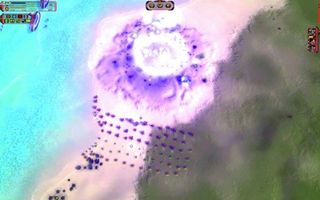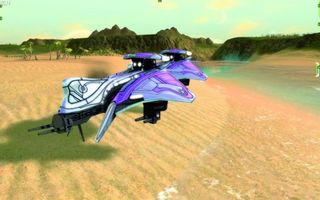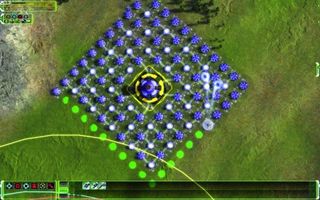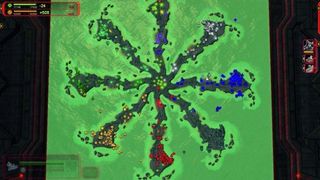The making of Supreme Commander

Personally, the sheer number of systems is part of what keeps me coming back to Supreme Commander – I keep thinking of new tactics to try or units to combine. But Chris thinks it may have been a mistake to take on so much for the initial release. “I think we habitually try to do too much, feature-wise. And that hurts the quality, and the ability to make our dates, and drives the cost of making these games way up.”
"If it wasn't for the game taking three years to make, we would have been in big trouble... Newer, faster machines saved our butts!"
But because they were making such a demanding game, the fact that it took so long actually ended up being a blessing. “Building the 'biggest ever' RTS engine was a huge challenge." Chris says. "We really pushed the capabilities of the current PC right to the limit. If it wasn't for the game taking three years to make, we would have been in big trouble... newer, faster machines saved our butts!”
Gas Powered talked to a lot of publishers about Supreme Commander, and initially they signed with Chris's former employer Electronic Arts. “After about a year, EA was moving more to console,” Chris says, so GPG switched to THQ. He has nothing but good things to say about that relationship, and calls it “another stroke of luck for the project, because we managed to get a larger budget and more time”.
THQ's faith was vindicated: Supreme Commander knocked World of Warcraft expansion The Burning Crusade off the top spot in the North American PC sales charts. It sold better than Total Annihilation, and got equally glowing reviews – including a 91% score from us. Newer, faster PCs were evidently popular enough for the game to be a success, but it did still feel technologically ahead of its time. The reactions we heard from our readers were split about evenly between “Wow this runs badly!” and “Wow this is cool!” Today, of course, a mid-range machine can eat it for breakfast.

I ask Chris if anything surprised him about the game's reception. “The only thing I can remember is that the tutorial was weak, and for many the game may have strayed too far from its roots in Total Annihilation.” But for those who appreciated its ridiculous scope, and had machines that could handle it, it was mindblowing. On its biggest maps, I've had games that lasted over six hours. I've built stationary guns so big they took 45 minutes to complete. I've set up bases just to give my aircraft a place to refuel.
Supreme Commander developed a competitive scene: a 4 vs 4 team game on an 81km x 81km map looks like the climactic battle of a big-budget sci-fi movie. But the way most of us in the office played – and still play – is alone or in co-op. Taking on the AI gives you a little more time to grapple with the game's complex economy and build a spectacular army without human players rushing you. And although the AI was good at launch, it was dramatically improved later on. Just not by Gas Powered.
When the game was released, Mike Robbins was on his third month of being unemployed. He and a friend, also called Mike, were excited. “We thought it would be fun to make changes to the AI, and face them off against each other... it wasn't the best time in my life, and I think working on the AI mod gave me something to keep me focused on while I worked my way back up out of the hole I was in.”
Comic deals, prizes and latest news
Sign up to get the best content of the week, and great gaming deals, as picked by the editors.
That was the Sorian/Jaws2002 AI mod, and it was a huge improvement.

“Mike and I spent the next few months tweaking and refining the AI, and integrating feedback to make the AI as fun to play against as we could.” Supreme Commander's economy system was so complicated that even its own AIs screwed it up: they'd frequently overproduce, wasting time boosting their resource gathering when they didn't have the production facilities to spend it. Sorian AI makes them much more efficient, and much better at reacting to how you attack.
"The next game in the loose lineage of TA and SupCom may come from outside Gas Powered."
“If the AI sees an opponent building long-range artillery within firing distance of its base,” Mike says, “it will start building shields to protect itself.”
Gas Powered ultimately hired Mike for his AI skills, but the timing was awkward. He joined towards the end of the development of Supreme Commander 2 – too late to do much to that game's weak AI, but he later helped to massively improve it in an official patch. He was there in time to work on the AI for their fantasy RTS Kings and Castles, but development on that was suspended indefinitely when Gas Powered couldn't find a publisher.
The next game in the loose lineage of Total Annihilation and Supreme Commander may come from outside Gas Powered. Supreme Commander programmer Jon Mavor left the company when the game was complete, to form Uber Entertainment. Like Chris, he started by making something completely different: competitive shooter Monday Night Combat. But he and his team are now developing their own take on the large-scale RTS: Planetary Annihilation. Its maps span several planets, it raised $2.2 million on Kickstarter and, after much nagging, they've persuaded Mike Robbins to join them.

“It wasn't an easy decision,” Mike says. “GPG was the only development studio that gave me a shot.” But Uber could offer him the kind of work he really wanted to be doing. “Jon told me Planetary Annihilation was tailormade for me – it would give me the chance to exercise my passion for AI without the influence of having to deal with a publisher. So I decided to make the move.”
Gas Powered, meanwhile, are struggling. Despite their critical and commercial success, none of their projects made enough money to start earning Gas Powered royalties. The terms of publishing deals for medium budget games are just too demanding: if a developer needs 10 million to make their game, it has to make five times that before they start seeing any of it. That left Gas Powered dependent on the next publishing deal for its survival, and those all fell through last year.
Their last hope was Wildman: an action RPG with RTS elements that they hoped to fund through Kickstarter. But it was a tough concept to grasp, and wasn't close to getting funded when Chris cancelled the campaign four days before its scheduled finishing date.
In a cryptic video, he said the reason is related to something that might save Gas Powered. Two days later, World of Tanks creators Wargaming.net announced they'd acquired them. We still don't know what that'll mean for Gas Powered's next project, but it has to be a positive that they still exist.
If the developer of something as spectacular and enduringly fun as Supreme Commander can't stay afloat, there's something seriously wrong with this industry.
Postscript: Gas Powered Games was absorbed into Wargaming.net, becoming Wargaming Seattle. It was shut down in 2018.
Most Popular




